I've always had a soft spot for this photograph...
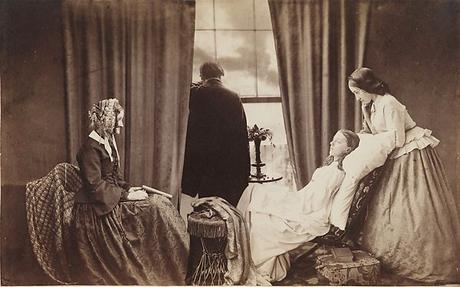
Fading Away (1858) Henry Peach Robinson
The tragic little girl in the middle just dying from too much Victorian-ness is irresistible. Maybe she went out without her coat? Maybe she was accidentally crowned the Queen of the May? We shall never know because off she popped, quick as you like. Anyway, I ended up buying a book because it was on the front cover (yes, I am that shallow, but it has resulted in me reading all kinds of books I might not have picked up otherwise)...
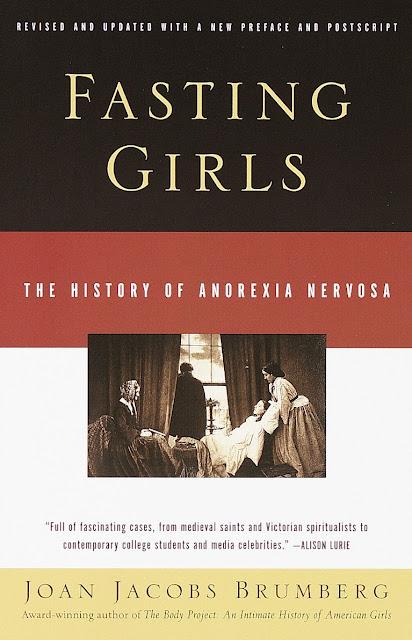
Published in 2000, this is a fascinating book and I ended up falling down a rabbit hole of 'Fasting Girls' and the utterly terrifying world of anorexia mirabilis, the act of self-starving in order to echo the suffering of Christ but also, conversely, women (let's be honest, this is a mainly woman thing because it is to do with food and punishment) who seem to miraculously exist without food, sustained by God. The Victorians are absolute gems for this sort of thing, being stuck between the two worlds of modernity and superstition. They also record and report, which is a blessing, so we can all read about one of the most famous Fasting Girls, Sarah Jacobs, through the newspaper reports that charted her fame and subsequent death. Sorry, spoiler alert, you can't exist without food, so don't get too attached to a miraculous girl who seems to do so. Sarah Jacobs supposedly had not eaten for long periods from the age of 10, then was entirely and miraculously without food from around her 11th birthday. A watch was set up, scientifically, to record her lack of food and she starved to death within a week. Her parents were convicted of manslaughter.
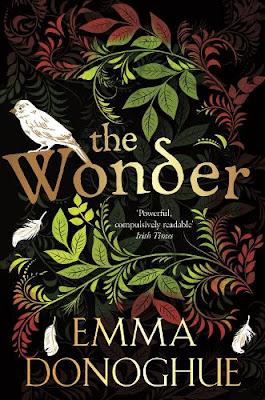
With all this in mind, I was very interested to read Emma Donoghue's 2016 novel The Wonder, a fictionalised account of a nurse sent to watch an alleged 'fasting girl' in Ireland, in 1859. We follow Elizabeth 'Lib' Wright (how very Dickensian, because she is 'right'. Or is she?), a nurse trained by Florence Nightingale, war-wearied and widowed, as she approaches the case of the miraculous Anna O'Donnell with extreme scepticism. Try as she might, she cannot see how this 'wonder' is performed and she begins to feel the slip of science and the overwhelming wave of superstition, as she remains a stranger in a strange land. I was a big fan of Donoghue's 2011 novel Slammerkin, and as the summary of The Wonder felt very much like Affinity by Sarah Waters, I was eager to read it and of course, watch the Netflix film, released on 16th November...
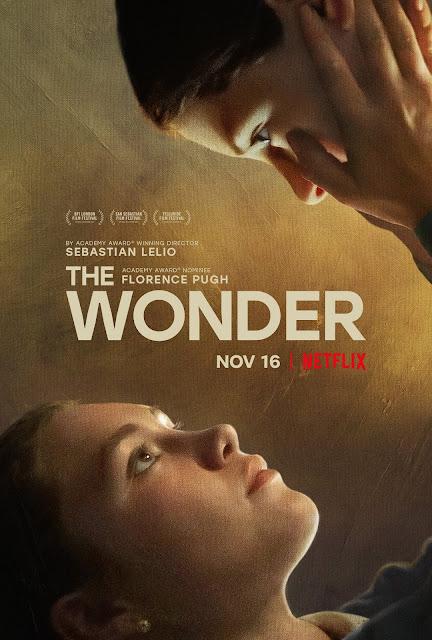
I will try and remain spoiler free as this is a twisty piece. The reason I liken it to Affinity is that, just like Margaret Prior is pulled into the magic of Spiritualism despite her reasoning, the struggle that Lib has with what she can see and what her common sense tells her about the so-called miracles of little Anna is a large part of the tale. This is heightened in the film because the actresses playing Anna and Lib are actually very similar in size and appearance, so the little girl doesn't seem to be suffering at all, and there is a feeling of a doppleganger sent to bring Lib's own secrets to the surface. In the book, there are descriptions of dropsy, swelling of limbs and a physical deterioration which is very worrying, but apart from the loss of a tooth, Anna isn't physically damaged in the film. So, how is she managing it?
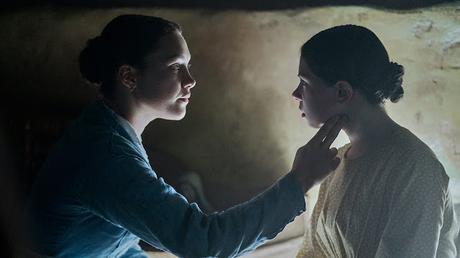
Florence Pugh and Kíla Lord Cassidy as Lib and Anna
This is a story about stories, heightened by the very divisive trick of showing the viewer the back of the film set as the story begins, just to tell us not to get too immersed, we are being fooled. We are happy to be fooled, it is our entertainment to believe that Florence Pugh, a very talented 26 year old actress from Oxford, is really a Crimea-veteran nurse from somewhere unspecifiedly Northern in the 185s, but it is jarring to be pulled in and out of the illusion. This is deliberate and is a repetition of a moment in the book and film, where Anna plays with a thaumatrope of a bird in a cage. In and out the bird goes as she spins it - so are we in or out of the story? In or out of the ensnarement of superstition? Is Lib the liberator of Anna, as her name suggests, or not?
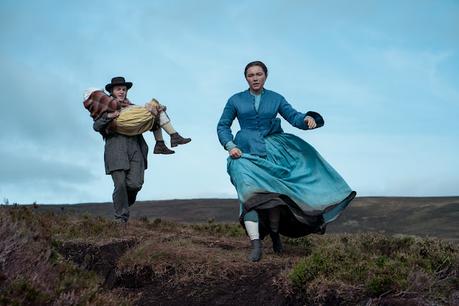
Tom Burke as journalist William Byrne, carrying Anna
Another thread is education - the women are deprived of it and are slowly going mad or remaining under the weight of folklore. The men who have it seem unable to use it, as the doctor suspects that Anna is living off sunshine or magnetic forces. In the book, he believes she is slowly changing into a lizard. Lib's own teaching comes to her over and over again but is little help in such a different environment where she is very much alone, other than a friendly journalist, William Byrne. Lib's isolation, the community involvement in the 'miracle' of Anna, and the secrets that the community are carrying all combine for a equally tragic and triumphant ending.
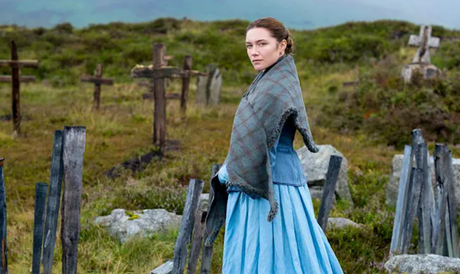
If I have complaints of the film, it is mainly the pacing which is quick by necessity. The book, while not enormous, is a slow burn of anxiety which includes lengthy descriptions of Lib's thoughts and her watch over her subject that wouldn't translate to film. I also have major problems with the ending of both, but I'll say no more because of spoilers. There are a few added extras in the film which I felt were unnecessary - spirited sex in a doorway is all very jolly but I'm a little sceptical of its necessity. Also, not every woman in the 19th century was on laudanum. There are two times in the film where Lib does something that the character in the book knows to be tempting but utterly fruitless - force feeding, which is horrific to watch, and bringing up a secret at the committee meeting. Book Lib was right, both things were completely pointless and awful. Film Lib obviously isn't as wise as Book Lib, but that's laudanum for you. Say no to drugs.
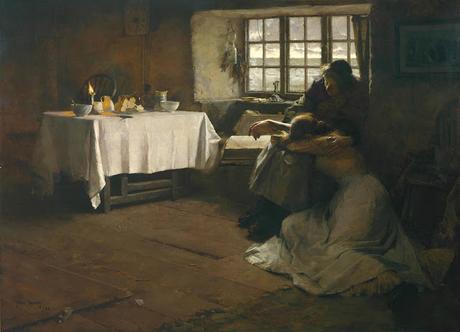
A Hopeless Dawn (1888) Frank Bramley
For all my complaining, this is a gorgeous film to watch with the cinematography coming out of the Newlyn School of Art by the look of it. The blues, greens and slate gray color palate is beautiful, with the house a mass of shadow and light. Everyone has a resigned look, like they know something is coming and they can't stop it, they just need to survive it and hope for a miracle. Fresh on the heels of famine, with scarcely enough food to feed everyone anyway, the quest for miracles becomes understandable and completely at odds with Victorian England's thundering passage to the Modern World. Like Lib, the audience is complacent, looking down at the 'backward' countryside that could believe in the impossible to the point of destruction, but when the truth is revealed it is not what you expect and possibly even more terrible. Perfect for those who like a bit of supernatural in their Winter, but I thoroughly recommend the book as you will not see the twists and turns coming.
The Wonder by Emma Donoghue is available everywhere, no doubt with a lovely new tie-in cover, and the film of the book is available now on Netflix.

